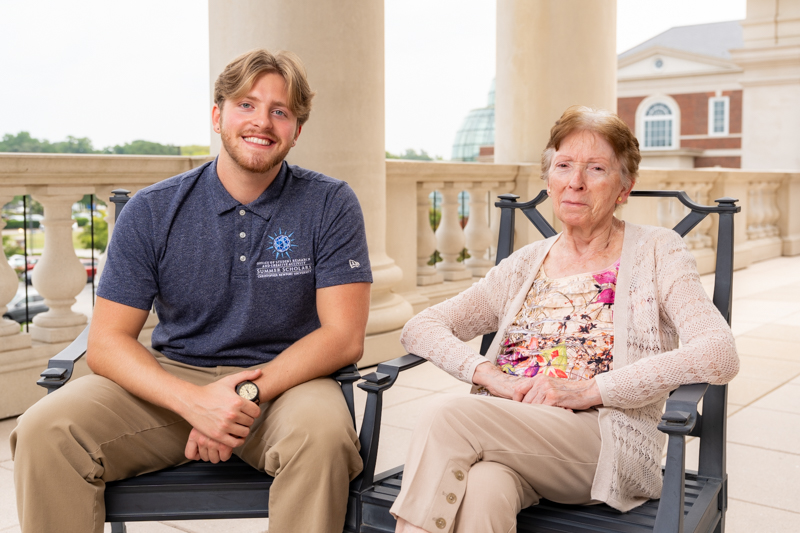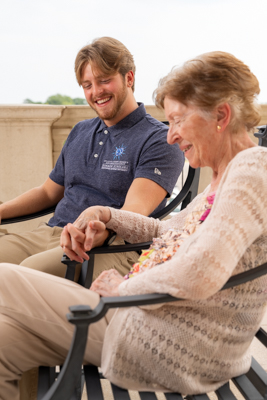
Above: Sevrin VanDevender '25 and Yaya
Read time:

When Sevrin VanDevender walks into a room with his grandmother - affectionately called Yaya - the love they have for each other radiates. They hold hands and finish each other’s sentences. She is his person and he is hers.
So when Yaya - known to the rest of the world as Maria Tucker - became ill, VanDevender, ‘25 Psychology, found his life quickly changing. His college and home worlds melded and transformed.
He knew that as a Captain, he would be immersed in learning. What he didn’t know was that his newfound knowledge from the classroom would have a life-changing impact on his family.
To help Yaya, who is 85, return to health, lots of hands-on attention was required. That attention left in its wake detrimental exhaustion that played out as everyone did their best to attend to her needs. He saw firsthand the emotional and physical toll it took on his mother, Beatrice, and other family members.
Seeing his mother falter under the pressure set VanDevender on a research quest to understand compassion fatigue, which is a state of emotional and physical exhaustion that can occur when someone helps others who are in need.
VanDevender knew he needed to do something to bring relief.
As a psychology student, VanDevender was aware of a focus in the research world on compassion fatigue (CF). He felt strongly that he should contribute to the effort to help people struggling with it, for both his mother’s sake and for people around the world dealing with similar situations.
He set out on a journey to discover answers. VanDevender carefully divided his time, balancing his coursework with helping his mother with Yaya’s care, while also dedicating hours to studying compassion fatigue. His research quickly revealed that his family was not alone in the struggle.
One recent study published in the journal Aging & Mental Health shows that 71% of family caregivers experience high levels of caregiver burden, or stress, and as many as 59.5% experience signs of burnout or compassion fatigue.
There is a plethora of science behind compassion fatigue, but plenty of space for VanDevender to make his mark advancing the research. And the mentor he needed was right here at CNU.
Dr. Sherman Lee, associate professor of psychology, was doing similar research. The two began working together to discover the underlying triggers for compassion fatigue and how caregivers can avoid it.
As part of their research, VanDevender and Lee interviewed caregivers to learn about the negative effects they can experience while caring for an ill patient. They are currently analyzing grief reactions of professionals whose patients died while under their care. They also have worked to identify key risk factors, such as personality traits, such as high empathy, and poor social support, that predispose people to compassion fatigue.
“Mental health researchers can use this information to identify and support these high risk people and hopefully provide necessary support before they develop the condition,” Lee said.
To understand VanDevender’s motivation to combat CF, one only needs to watch him interact with his grandmother. They share a deep and unbreakable bond. She is his why.
“For as long as I can remember, going to visit my grandmother has been a highlight of my life. I love her more than life itself and she reciprocates that to me tenfold. As I get older, I continue to appreciate more and more just how much love and support she provides me with,” he said.
The love is undeniably mutual. Yaya cherishes her relationship with her grandson.
“He brings the best out of me,” she said. “I am 100 percent very proud of him.”
VanDevender says his grandmother hoped he would attend CNU so he could stay close to the family’s home in Poquoson, Va. The decision to become a Captain turned out to be the right one, as VanDevender could visit his grandmother often, and at the same time, conduct research on campus that would improve her life and lives of those around her.
As VanDevender continues to learn more about compassion fatigue, he is powered by the idea that his research strides have the potential to make an enormous difference to his family’s health. Nothing is more important, he said, than ensuring his grandmother benefits from his hard work.
“Research on compassion fatigue is something that I hold as being extremely important to her and other elders. My grandmother has given me so much, and it makes me happy to know that through this research, I can return even a small amount back to her,” he said. “I believe that elders deserve the best care possible, and any research done on caregiving is important in achieving that goal. Grandparents do so much for their children, and especially their grandchildren, and I think it’s our responsibility to make sure that we return that love and care back to them.” The opportunity to do research as an undergraduate has pushed him out of his comfort zone, and allowed him to build self-confidence.
“It has taught me resilience, hard work, dedication, and appreciation,” he said. “Research can be very difficult at times, but it's one of the most worthwhile endeavors you can undergo in undergrad. I believe it is thanks to my experience with research here at CNU that I have been prepared to tackle anything that may come my way.”
VanDevender is hoping to use the research on CF as a foundation on which to earn his PhD in psychology and hopefully, one day be a professor of psychology.
“Pretty much every professor I’ve had here at CNU has had a tremendous positive impact on me, and I would love to provide that same positive impact on future generations of students,” he said.